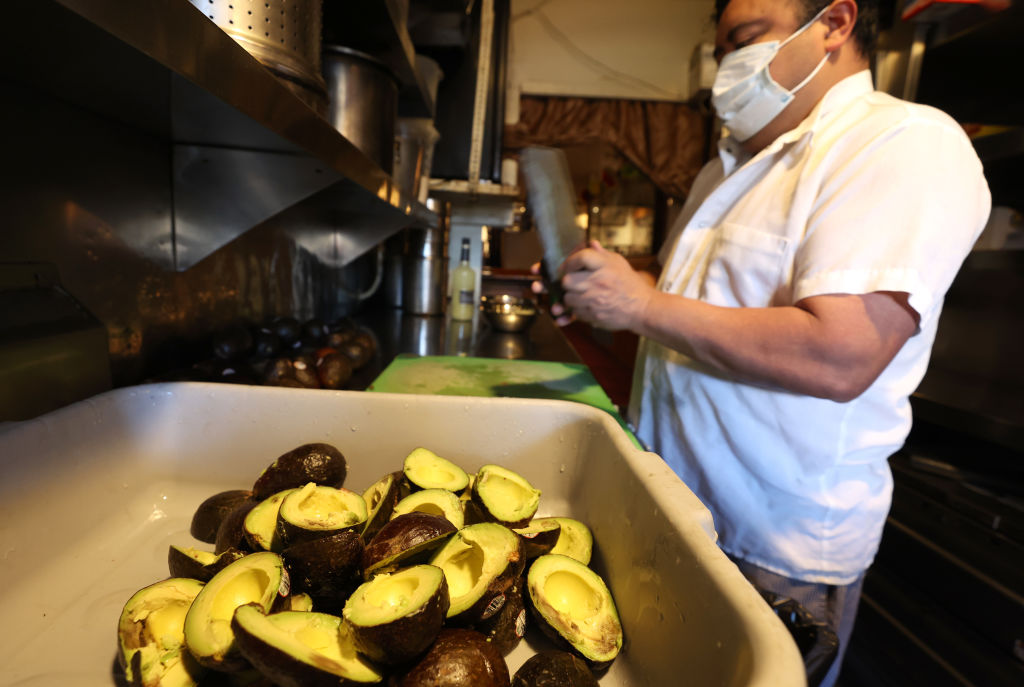Avocados will soon run out at smaller restaurants that don’t have the buying power of Chipotle Mexican Grill Inc.
For example, Salsarita’s Mexican-themed restaurants won’t be able to make any more guacamole in about a week — 10 days maybe if they can stretch it. The 75-unit chain isn’t optimistic about getting any more avocado supplies for awhile amid a suspension on imports from Mexico, which accounts for 80% of U.S. supply. So the inventory is what it is, according to Chief Executive Officer Phil Friedman.
“We’ll use what we have. I’m not going to look for any type of alternative, we’re just going to announce to our customers that guacamole is not available until further notice,” he said in an interview.
The avocado crunch is just the latest disruption in the food supply chain, which has been roiled by the pandemic with labor shortfalls, and shipping and logistics headaches. It’s part of what’s behind the fastest pace of inflation for consumers in four decades.
Small restaurants are bearing the brunt of the supply chain turmoil. Businesses like Salsarita’s can’t negotiate large-order discounts, and don’t always have the cash reserves to pay premiums when competition for a product heats up. Costs are “horrendous,” Friedman said, noting that in addition to avocados, cups are hard to get currently.
“Everything we’ve gone through, every week is constant change with supply chain,” he said.

Even Chipotle, which recently opened its 3,000th location, said it has just “several weeks” of supply of avocados, and it can pull from other regions such as Peru.
“Our supply chain is hot on the path and working every angle, I assure you,” Chief Restaurant Officer Scott Boatwright said in an interview.
The U.S. Department of Agriculture’s halt on avocado imports from Michoacán, a coastal state just west of Mexico City, went into effect Feb. 11. A supervisor had received a threatening call because an inspector refused to certify an avocado shipment, the U.S. Department of Agriculture said in an emailed statement to Bloomberg on Thursday. The agency said it won’t lift the ban until it’s sure employees are safe.
“We must have assurances that our employees’ lives are not at risk,” the statement said.
Avocado prices are soaring in the meantime, with Mexican prices nearly triple that of a year ago, according to Mexican government data.
Some businesses are looking for alternative avocado sources. The week after the Super Bowl is usually slow, but J.R. Simplot Co. has seen about a 20% uptick in buyer interest from food service clients for its frozen and pre-packaged guacamole products, which have a longer shelf life than fresh avocados, said company spokesperson Josh Jordan.
Mexican-inspired restaurant El Barrio in Birmingham, Alabama, usually pays between $30 to $40 dollars for a case of 48 avocados, said co-owner and chef Neville Baay. Now, the price has jumped to $65 dollars. If the price gets high enough, they might have to pull it from the menu, even though guacamole is a best-selling item.
“The Chipotles and Taco Bells of the world can ride with the current,” said Baay. “We have to take our lumps and hope it doesn’t get too bad.”
More Must-Reads from TIME
- Cybersecurity Experts Are Sounding the Alarm on DOGE
- Meet the 2025 Women of the Year
- The Harsh Truth About Disability Inclusion
- Why Do More Young Adults Have Cancer?
- Colman Domingo Leads With Radical Love
- How to Get Better at Doing Things Alone
- Michelle Zauner Stares Down the Darkness
Contact us at letters@time.com